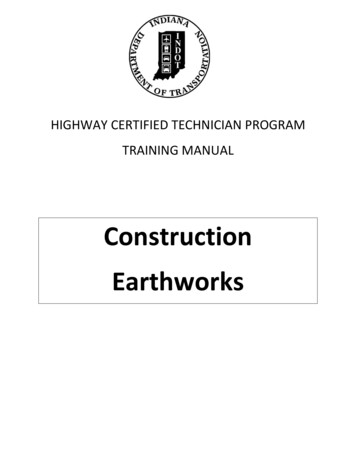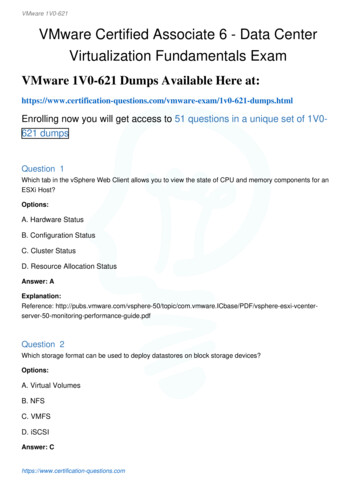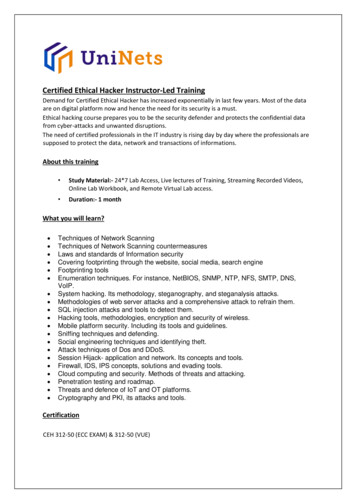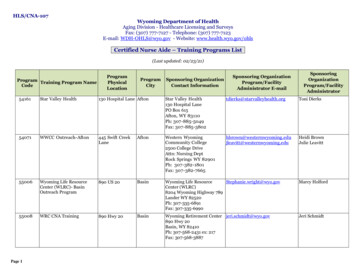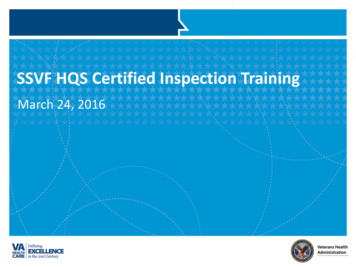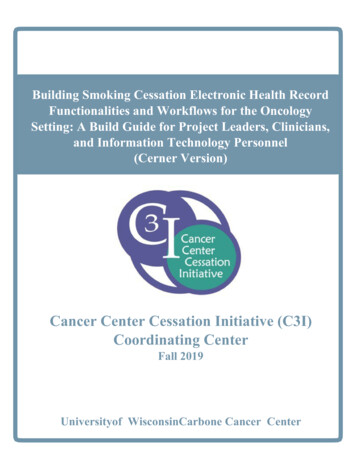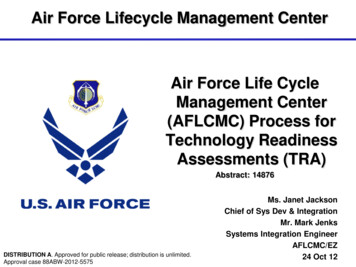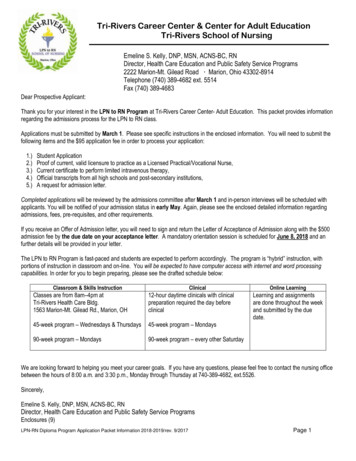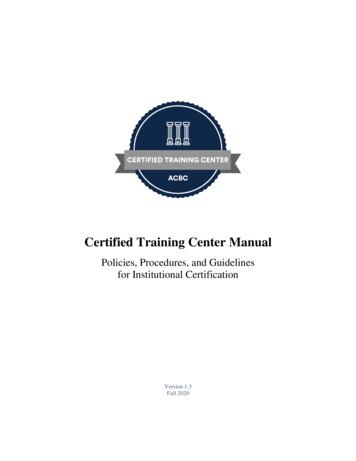
Transcription
Certified Training Center ManualPolicies, Procedures, and Guidelinesfor Institutional CertificationVersion 1.3Fall 2020
ACBCTable of ContentsSection 1 Introduction2Section 2 Benefits of Institutional Certification3Section 3 Institutional Certification Process4Section 4 Maintaining Certified Status12Section 5 General Accrediting Matters15Section 6 Counseling Specializations20Section 7 International Training Centers25Section 8 Marketing & Branding26Appendix 1 Fundamentals Training Course36Appendix 2 Marriage Counseling Specialization50Appendix 3 Reconciliation Counseling Specialization41Appendix 4 Addictions Counseling Specialization43Appendix 5 Institutional Membership Covenant451
ACBCSection 1 IntroductionFor over 40 years, the Association of Certified Biblical Counselors (ACBC) hasbeen certifying biblical counselors to ensure doctrinal integrity and to promoteexcellence in biblical counseling. It is crucial that future counselors receive thehighest quality training in biblical counseling available. To help meet thiseducational need, ACBC certifies institutions. Upon examination and approval bythe ACBC Board of Trustees, these institutions will become an ACBC CertifiedTraining Center. Among other things, Certified Training Centers (CTC) performtwo essential functions:1. Provide biblical counseling training2. Provide biblical counseling servicesBy partnering with ACBC you are contributing to the advancement of the biblicalcounseling movement. As an ACBC CTC, you will equip counselors for ACBCcertification and persuade those in your region that God’s Word has the solutionsto the most difficult problems people face. We believe God is moving in Hischurch, calling us back to the sufficiency of Scripture for the counseling task.When you pursue ACBC certification, you are joining a unique movement that wasfounded upon and is growing out of the superiority and sufficiency of Christ andHis Word for Christian faith and practice.The purpose of this manual is to serve as a helpful resource for you as youprayerfully consider joining the mission of ACBC as a CTC. The following pageswill provide more details concerning the benefits of becoming a certifiedinstitution, walk you through the process, and provide clear expectations forinstitutions that become formally affiliated with ACBC. I look forward to workingwith and serving you.God Bless,Samuel E. Stephens, Ph.D.Director of Training Center Certificationsstephens@biblicalcounseling.com(816) 282-2835 x. 70122
ACBCSection 2 Benefits of Institutional CertificationThere are five (5) central benefits to your organization becoming an ACBCCertified Training Center:1. Advance the cause, mission, and purposes of biblical counseling throughoffering quality training that satisfies requirements for ACBC certification.2. Join an expanding network of carefully vetted, likeminded, and qualifiedbiblical counselors. This network exists to promote the sufficiency andsuperiority of the Lord Jesus Christ and His Word over man’s theories andinterventions for solving life’s problems. ACBC is made up of individualswho want nothing less than the full restoration of the Scripture’s sufficiencyfor the discipline of counseling, as a ministry of the local church.3. Receive guidance, encouragement, and resources directly from ACBC staff.This will include involvement with other directors of Certified TrainingCenters in regional director cohorts. These smaller groups function as athink-tank for issues in counseling and discipleship and facilitate discussionamong various centers on topics ranging from best practices to the theologyof counseling.4. Promote upcoming training center events on ACBC's website and socialmedia platforms. This exposure will make your organization more accessibleto those searching for training and counseling.5. Improve quality of training and services through the theological andmethodological rigors that come with becoming an ACBC Certified TrainingCenter. ACBC serves to encourage, acknowledge, and promote the essentialmethods and theology of biblical counseling. ACBC certificationcommunicates that your center is complying with, contributing to, andpromoting standards of excellence and ethics that adhere to a wellestablished and time-tested organization.3
ACBCSection 3 Institutional Certification ProcessThere are six (6) phases of the institutional certification process from initial contactto orientation and on-boarding. This section will provide an overview of the entireprocess along with a detailed explanation of each phase. Phases 1-4 include the preliminary assessment, application, programevaluation, and report of findings related to the institutional certificationprocess. An organization within any one of these phases is considered aProspective Training Center.o Phase 1 Pre-Application Assessmento Phase 2 Applicationo Phase 3 Evaluationo Phase 4 Report and Committee Referral Phase 5 comes as the Committee votes to recommend the ProspectiveTraining Center for a full vote of the Board of Trustees. An organizationwithin this phase is considered a Candidate Training Center.o Phase 5 Board Decision Phase 6 comes at the successful completion of the institutional certificationprocess and culminates in the organization becoming a Certified TrainingCenter.o Phase 6 Orientation and Operational Requirements4
ACBCPROSPECTIVE TRAINING CENTERPhase 1: Pre-Application AssessmentFrom initial contact, interested centers are considered Prospective TrainingCenters.1 The initial phase is conducted through an interview with the Director ofTraining Center Certification in the early stages of inquiry. In order to receive theApplication of Training Center Certification, the prospective center must be able todemonstrate a “two-year record of full operation” in accordance with each of preapplication requirements outlined below.2 ACBC Guiding DocumentsProspective training centers “must be organized in accordance with, andsubscribe to, the principles and practices contained” in the ACBC guidingdocuments. These documents include the following.3a.b.c.d.Standards of DoctrineStandards of ConductConstitution and BylawsPolicies and Procedures Ecclesiastical AuthorityProspective training centers must show a “responsibility to, and workingrelationship with, a duly recognized ecclesiastical authority such as a church,group of churches, and/or denomination subscribing to the Christian values.”1Prospective Training Centers are not yet formally affiliated with ACBC. This means that no part of theirtraining program is counted toward the fulfillment of ACBC certification.For each of these requirements, see Policies and Procedures under the heading “InstitutionalCertification Procedures: Pre-Application” and in the By-Laws under the heading “Article IV.Institutional Membership”2Institutions formally affiliated with ACBC must teach “in accordance with and not contrary to” thedoctrine and standards as expressed within these particular documents. These are available in full online.Prospects must also affirm statements made in conjunction with the ACBC Board of Trustees includingthe Statement on Mental Illness and Medicine and the Statement on Gender.35
ACBCNOTE: Centers may have multiple sponsoring institutions that provide resources(e.g. facilities, monies, staffing), but there must be only one (1) identifiableecclesiastical entity that has direct authority and oversight of the center. Counseling ServicesProspective training centers are required to demonstrate excellence inproviding biblical “counseling services.”NOTE: ACBC requires that a system of counseling services should be in place fornot only intake purposes, but also for quality biblical counseling training leading tocertification. Training centers in good standing are expected to provideopportunities for their students to observe and participate in counselingrelationships under the guidance of certified members, directors, and instructors. Quality TrainingProspective training centers must demonstrate excellence in biblicalcounseling training, curriculum, and instruction. This substantive trainingprogram must be offered for at least two (2) years prior to application,ideally with at least one full cycle of a complete curriculum being offeredduring that period. 4Phase 2: ApplicationUpon meeting all of the Phase 1 requirements, and upon the discretion of theDirector of Training Center Certification, the Application for Training CenterCertification will be released to the prospective training center. This applicationserves as the basis for the evaluation and is an important part of the overallcertification process.At this point, the prospective center enters Phase 2. The subsequent steps areoutline below.4Adherence to the ACBC Fundamental Training Course is not a pre-application requirement; however,prospective centers that do not have a curriculum that corresponds to this template typically do notadvance through the application process.6
ACBC The Director of Training Center Certification will send an e-mail to theprospective training center asking them to complete the Application forTraining Center Certification and submit it, along with all requestedmaterials.5 Once all required documentation has been received and processed, theDirector of Training Center Certification will send a subsequent e-mail thatprovides instructions for the payment of a one-time, non-refundableapplication fee of 500.00. After the fee has been paid, the Director of Training Center Certification willwork with the applying center in order to create an institutional profilethrough the ACBC Training Center Portal for membership and eventmanagement purposes.After these steps have been completed, the applying center will move into the nextphase of the process.Phase 3: EvaluationUpon meeting all of the requirements and expectations set out in Phase 2, theDirector of Training Center Certification will be cleared to begin a thoroughexamination of the prospective training center.Due to the multifaceted nature of this phase, ACBC will refrain from providing anestimated timeframe for the completion of the evaluation. At any point in thisphase, ACBC reserves the right to request revisions for sub-standard materials orsupplemental items.This examination will include, but may not be limited to, the following:5A link to the on-line application will be sent to the applicant in an e-mail with more detailedinstructions.7
ACBC Review the application and document any questions, concerns, andobservations for further follow-up. Evaluate course lectures (e.g. instructor notes, student handouts, visualpresentations, etc.), listen to audio of course instruction, and review anyother course information that is pertinent.6 Evaluating counseling practices Conduct interviews for the purpose of gathering data from center leaders,authority holders, instructors, counselors, students, and ACBC BoardMembers and Fellows. Visit the center, if deemed necessary by the ACBC Training CenterCertification Committee (TCCC) or the ACBC Board of Trustees.7After the entire evaluation process has been completed, the applying center willmove into the next phase of the process.Phase 4: Report and Committee ReferralUpon the completion of the curriculum evaluation, interviews, and necessaryfollow-up related to data gathering, the Director of Training Center Certificationwill prepare a comprehensive report of the findings from the Phase 3 evaluationprocess.ACBC will refrain from guaranteeing or estimating a timeline for when aprospective training center will reach this point of the process.6Requested materials are listed in the application.7If deemed necessary, the Director of Training Center Certification and/or other appointed person(s) willvisit the applying center for evaluation. All expenses, including transportation, meals and housing for thereview team and an appropriate fee for the team’s time will be the sole responsibly of the applying center.8
ACBC A comprehensive report of the prospective center will be compiled andpresented to the TCCC for evaluation. 8 This committee is comprised ofmembers of the ACBC Board of Trustees. The TCCC will then respond in one (1) of the following ways:1. Recommend the center to the full ACBC Board of Trustees who willthen vote on the applying center at one of their Quarterly Meetings orthe Annual Meeting in October.92. Ask the Director of Training Center Certification to gather moreinformation and perform a follow-up presentation to the TCCC at alater date.3. Deny the application of the prospective center.The prospective center will receive an official decision (in the form of an e-mailand/or official letter) communicating the decision of the TCCC by the Director ofTraining Center Certification.After prospective centers have been recommended by the TCCC to move to a finalvote by the Board of Trustees, that center will move to the next phase of theprocess.8Depending upon current demand and workload, Training Center Certification Committee meetings arecalled to review reports for at least 3-4 prospective centers at a time. These meetings will be scheduled asthese numbers of evaluations and reports are completed.9Certification is granted upon a 2/3 majority vote by the ACBC Board of Trustees. The annual Board ofTrustee meeting takes place prior to the ACBC Annual Conference.9
ACBCCANDIDATE TRAINING CENTERPhase 5: Board DecisionCenters that move into Phase 5 will be considered Candidate Training Centers.10It is during this phase of the process that the Director of Training CenterCertification will compile a comprehensive report for the Board that will containthe training center’s basic information, critical observations from the Director ofTraining Center Certification, and an abridged transcript of the Training CenterCertification Committee meeting in which the decision was made to recommendthe center.Prior to the ACBC Annual Conference, or in some instances the quarterly meetingsof the full Board of Trustees, the Board will meet to vote upon therecommendation of the TCCC, a sub-committee comprised of Board members.During this portion of the meeting, the Board will have an opportunity to askfurther questions of TCCC members, the Director of Training Center Certification,and the Executive Director. The Board of Trustees will respond in one of the following ways.1. Vote to approve and affirm the recommendation of the TCCC.112. Ask the Director of Training Center Certification to gather moreinformation and perform a follow-up presentation to the Board at alater date.3. Vote to reject the recommendation of the TCCC and deny certifiedstatus to the candidate center.The candidate will receive an official decision (in the form of an e-mail and/orofficial letter) communicating the decision of the Board by the Director of TrainingCenter Certification. After Candidate Training Centers have been approved by theBoard, that center will move to the next phase of the process.10Candidate Training Centers are not yet formally affiliated with ACBC. This means that no part of theirtraining program is counted toward the fulfillment of ACBC certification.11Certification is granted upon a 2/3 majority vote by the ACBC Board of Trustees. The annual Board ofTrustee meeting takes place prior to the ACBC Annual Conference.10
ACBCCERTFIED TRAINING CENTERPhase 6: Orientation and Operational RequirementsUpon approval by the Board of Trustees, the Prospective Training Center isimmediately granted certified status and now enjoys the rights and privileges ofbeing an ACBC Certified Training Center including, but not limited to, the benefitsoutlined in Section 2 of this manual.After approval by the Board of Trustees, the Director of Training CenterCertification will schedule a meeting with the director of the newly approved CTCfor the purposes of onboarding and orientation. The following elements will beaddressed: In conjunction with Membership Services, the newly approved center will beconnected with an ACBC Fellow or Member of the Academy who shallprovide supervision to that center.12NOTE: By “supervision” the guiding documents of ACBC expect all certifiedinstitutions to be formally associated with a Fellow or Member of the Academy whoshall ensure quality and compliance in the areas of counseling and trainingthrough maintaining an ongoing relationship with that center, providing guidanceand instruction when requested, and assisting the center during times of annualreporting, systematic reviews, or occasional audits. The newly approved center, along with the supervising Fellow, will schedulean interview with the Director of Training Center Certification for a time notexceeding six months within their first year of becoming certified.13 The center may update their profile information, be provided relevant log-incredentials, and be reminded of important dates (e.g. renewals, specialevents, new initiatives, etc.) The newly approved center will be oriented to ongoing certification mattersas seen in the remainder of this manual.12See “Article IV. Institutional Membership” of the ACBC Bylaws.13The purpose of this meeting is to provide a health check and to determine that all requirements andexpectations are being met.11
ACBCSection 4 Maintaining Certified StatusIn addition to the keeping the pre-application requirements outlined in this manual(see Section 3, pages 5-6), ACBC Certified Training Centers considered in goodstanding with the organization, must at all times meet and fulfill the responsibilitiesoutlined below.Failure to adhere to any of these requirements will result in an audit of the trainingcenter in question and may necessitate revoking the center’s certified status.The following two (2) elements are crucial in maintaining compliance and goodstanding as a certified institution of ACBC. Specific Training Requirements Annual Renewal ProcessSpecific Training Requirements:The quality and standards of the training at an ACBC Certified Training Centermust correspond to the following: Training programs must be “designed to meet at least the requirements forindividual membership” in ACBC. These are outlined, in part, in the ACBCFundamentals Training Course (see Appendix 1). The entirety of the core fundamentals content (e.g. Fundamentals TrainingCourse) must be taught by an ACBC certified counselor.14 At least 50% of the content must be taught by qualified men.1514This requirement was approved and passed by the Board of Trustees during their 2019 annual meetingin Memphis, Tennessee. Certified Training Centers will be given three (3) years in which to comply tothis requirement. This requirement comes into effect on January 1, 2023.15The Board of Trustees relies upon the ecclesiastical authority of the training center to determine howthis requirement is to be met.12
ACBC At least 50% of the content must include coursework that is original indesign, organization, and delivery. It is expected that any borrowed work orintellectual property is appropriately referenced and cited.Renewal Process:In addition to maintain standards in the quality and frequency of training, CertifiedTraining Centers are required to renew their institutional certification on an annualbasis. The following three elements make up this renewal process.Annual ReportIndividual directors of Certified Training Centers, in conjunction with thesupervising Fellow, are responsible to complete the Training Center Annual Reportby a fixed date each calendar year.16The purpose of this report is to provide a comprehensive update to the ACBCBoard of Trustees concerning the condition, progress, performance, and overallhealth of each Certified Training Center during a particular calendar year. Thisreport will also aid in assessing the center’s compliance to all requirements andstandards outlined in this manual and provide ACBC the means by which to repo
1. Provide biblical counseling training 2. Provide biblical counseling services By partnering with ACBC you are contributing to the advancement of the biblical counseling movement. As an ACBC CTC, you will equip counselors for ACBC certification and persuade
